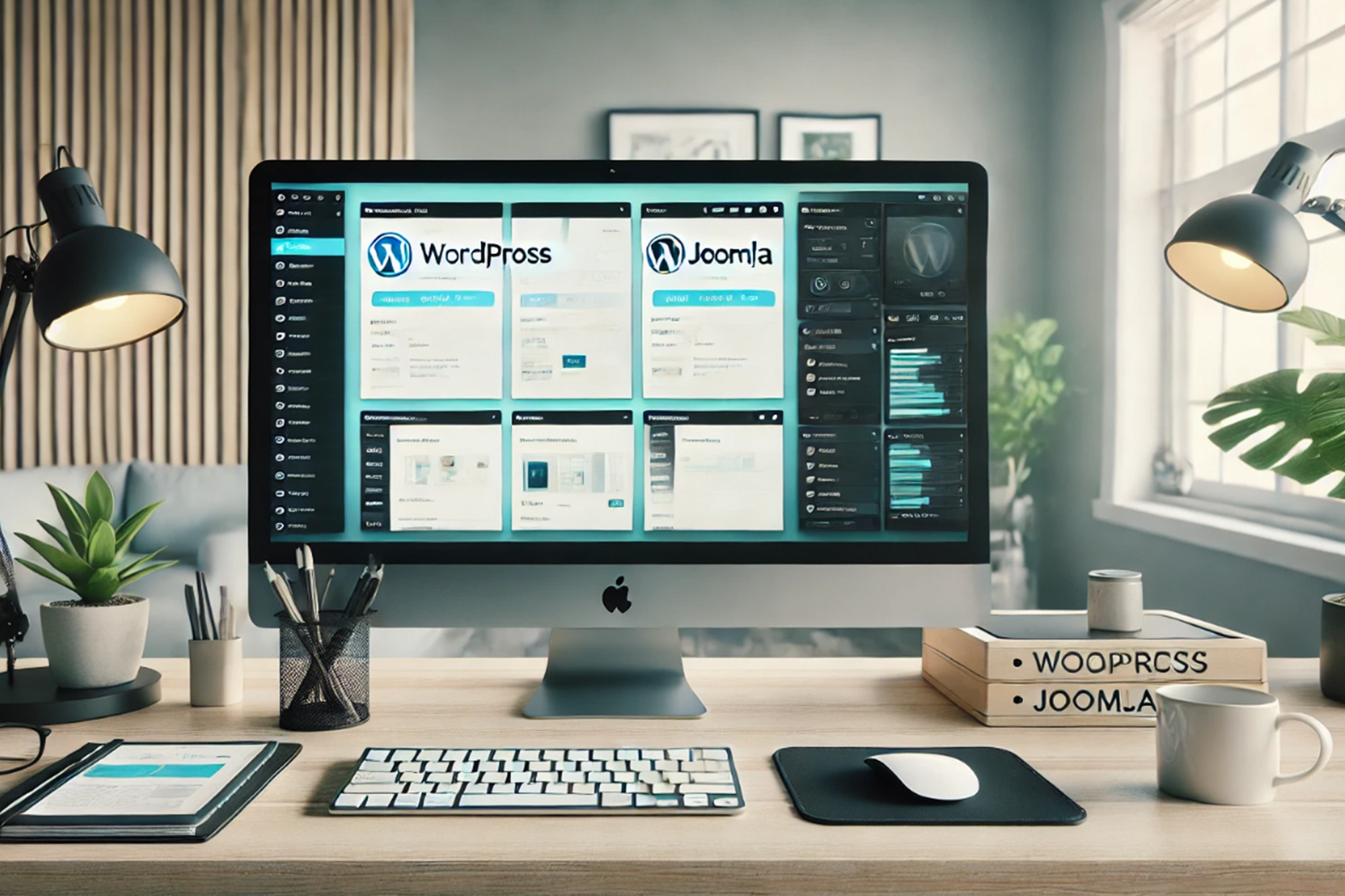WordPress vs Joomla
How to choose the best CMS
Search Engine Optimization (SEO) is the process of optimizing a website to improve its visibility and ranking in search engine results pages (SERPs).
The goal of SEO is to increase organic (non-paid) traffic to a website by making it more relevant and authoritative to search engines like Google, Bing, and Yahoo.
Here’s how SEO works:
The choice between WordPress and Joomla as the best Content Management System (CMS) depends heavily on your needs, technical skills, and the specific type of website you want to build. Below is a comparison of the two platforms based on various factors:
1. Ease of Use
- WordPress: Known for its user-friendliness, WordPress is incredibly easy to use, even for beginners. It has a simple dashboard and intuitive navigation that allows users to set up and manage websites without much technical knowledge.
- Joomla: Joomla is more complex than WordPress, with a steeper learning curve. It offers more built-in features, but these can be more difficult to navigate for users who are not familiar with CMSs.
Best for Ease of Use: WordPress
2. Flexibility & Customization
- WordPress: WordPress is highly customizable thanks to its massive library of plugins (over 50,000) and themes. While it’s easy to get started with a basic blog or small business website, more complex customizations may require knowledge of coding (HTML, CSS, PHP).
- Joomla: Joomla offers more flexibility and is better suited for complex websites like social networks, membership sites, or large portals. It has more built-in options for customizations and layout control, which can be done without relying on third-party plugins.
Best for Flexibility: Joomla (especially for complex sites)
3. SEO
- WordPress: WordPress is often praised for being SEO-friendly. It has many SEO plugins (such as Yoast SEO) that make optimizing content for search engines straightforward, even for beginners.
- Joomla: Joomla also has good SEO capabilities but lacks the extensive plugin ecosystem that makes WordPress easier to work with for SEO. However, Joomla offers more control over SEO settings without relying on extensions.
Best for SEO: WordPress (due to easier SEO management with plugins)
4. Themes & Plugins
- WordPress: WordPress has an enormous marketplace of themes and plugins that cater to virtually any kind of website. From simple blogs to full-featured e-commerce stores, you can find solutions that are plug-and-play.
- Joomla: Joomla has fewer themes and extensions compared to WordPress, but it still offers a decent selection. However, many Joomla extensions are premium, and there are fewer free options.
Best for Themes & Plugins: WordPress
5. Security
- WordPress: Because of its popularity, WordPress is a bigger target for hackers. It relies heavily on third-party plugins, which can introduce vulnerabilities if not updated regularly. However, there are many security plugins that can mitigate this risk.
- Joomla: Joomla is considered more secure out of the box because it comes with built-in security features. That said, Joomla sites can also be vulnerable if not properly maintained or if insecure extensions are used.
Best for Security: Joomla (better security out of the box)
6. Community & Support
- WordPress: WordPress has the largest community of developers and users globally, making it easy to find support through forums, blogs, tutorials, and online courses. There’s also a wide selection of third-party services offering professional support.
- Joomla: Joomla also has an active community, but it is smaller compared to WordPress. While it’s easy to find help through forums and resources, the range of available third-party support is more limited.
Best for Community & Support: WordPress
7. Multilingual Support
- WordPress: While WordPress supports multilingual functionality, it requires the use of third-party plugins (like WPML) to manage multilingual content.
- Joomla: Joomla has multilingual capabilities built directly into its core, making it easier to create multi-language sites without additional extensions.
Best for Multilingual Sites: Joomla
8. Cost
- WordPress: WordPress itself is free, but depending on the theme and plugins you choose, the cost can vary. Many high-quality themes and plugins are available for free, with premium options for advanced features.
- Joomla: Joomla is also free, but since many of its best extensions are premium, you may end up spending more on extensions compared to WordPress.
Best for Cost: WordPress (for its vast number of free themes and plugins)
9. Content Management
- WordPress: Ideal for websites that focus on content creation, such as blogs or news sites. The editor (Gutenberg) is user-friendly and easy to learn for non-technical users.
- Joomla: Better suited for websites that need more complex content structures. Joomla allows more control over how content is organized and displayed, with more advanced options for different user roles.
Best for Content Management: Depends (WordPress for simpler content, Joomla for more complex structures)
Conclusion: Which is the Best?
- Choose WordPress if you are a beginner or need a simple, user-friendly platform with plenty of themes and plugins. It’s perfect for blogs, small business websites, portfolios, and basic e-commerce stores. It’s also great for users who need robust SEO features and a large support community.
- Choose Joomla if you need more flexibility and control over your website’s functionality, especially for larger, more complex sites with multiple user roles, multilingual support, or advanced content management. Joomla is often preferred by developers and those with some technical knowledge.
In summary, WordPress is best for most users, particularly beginners, while Joomla excels in flexibility for more complex projects.
We can help you choosing the best Website for your needs.
SHOW YOUR BUSINESS NOW!
Share this article.
Related Post
WordPress vs Joomla
How to choose the best CMS
Search Engine Optimization (SEO) is the process of optimizing a website to improve its visibility and ranking in search engine results pages (SERPs).
The goal of SEO is to increase organic (non-paid) traffic to a website by making it more relevant and authoritative to search engines like Google, Bing, and Yahoo.
Here’s how SEO works:
The choice between WordPress and Joomla as the best Content Management System (CMS) depends heavily on your needs, technical skills, and the specific type of website you want to build. Below is a comparison of the two platforms based on various factors:
1. Ease of Use
- WordPress: Known for its user-friendliness, WordPress is incredibly easy to use, even for beginners. It has a simple dashboard and intuitive navigation that allows users to set up and manage websites without much technical knowledge.
- Joomla: Joomla is more complex than WordPress, with a steeper learning curve. It offers more built-in features, but these can be more difficult to navigate for users who are not familiar with CMSs.
Best for Ease of Use: WordPress
2. Flexibility & Customization
- WordPress: WordPress is highly customizable thanks to its massive library of plugins (over 50,000) and themes. While it’s easy to get started with a basic blog or small business website, more complex customizations may require knowledge of coding (HTML, CSS, PHP).
- Joomla: Joomla offers more flexibility and is better suited for complex websites like social networks, membership sites, or large portals. It has more built-in options for customizations and layout control, which can be done without relying on third-party plugins.
Best for Flexibility: Joomla (especially for complex sites)
3. SEO
- WordPress: WordPress is often praised for being SEO-friendly. It has many SEO plugins (such as Yoast SEO) that make optimizing content for search engines straightforward, even for beginners.
- Joomla: Joomla also has good SEO capabilities but lacks the extensive plugin ecosystem that makes WordPress easier to work with for SEO. However, Joomla offers more control over SEO settings without relying on extensions.
Best for SEO: WordPress (due to easier SEO management with plugins)
4. Themes & Plugins
- WordPress: WordPress has an enormous marketplace of themes and plugins that cater to virtually any kind of website. From simple blogs to full-featured e-commerce stores, you can find solutions that are plug-and-play.
- Joomla: Joomla has fewer themes and extensions compared to WordPress, but it still offers a decent selection. However, many Joomla extensions are premium, and there are fewer free options.
Best for Themes & Plugins: WordPress
5. Security
- WordPress: Because of its popularity, WordPress is a bigger target for hackers. It relies heavily on third-party plugins, which can introduce vulnerabilities if not updated regularly. However, there are many security plugins that can mitigate this risk.
- Joomla: Joomla is considered more secure out of the box because it comes with built-in security features. That said, Joomla sites can also be vulnerable if not properly maintained or if insecure extensions are used.
Best for Security: Joomla (better security out of the box)
6. Community & Support
- WordPress: WordPress has the largest community of developers and users globally, making it easy to find support through forums, blogs, tutorials, and online courses. There’s also a wide selection of third-party services offering professional support.
- Joomla: Joomla also has an active community, but it is smaller compared to WordPress. While it’s easy to find help through forums and resources, the range of available third-party support is more limited.
Best for Community & Support: WordPress
7. Multilingual Support
- WordPress: While WordPress supports multilingual functionality, it requires the use of third-party plugins (like WPML) to manage multilingual content.
- Joomla: Joomla has multilingual capabilities built directly into its core, making it easier to create multi-language sites without additional extensions.
Best for Multilingual Sites: Joomla
8. Cost
- WordPress: WordPress itself is free, but depending on the theme and plugins you choose, the cost can vary. Many high-quality themes and plugins are available for free, with premium options for advanced features.
- Joomla: Joomla is also free, but since many of its best extensions are premium, you may end up spending more on extensions compared to WordPress.
Best for Cost: WordPress (for its vast number of free themes and plugins)
9. Content Management
- WordPress: Ideal for websites that focus on content creation, such as blogs or news sites. The editor (Gutenberg) is user-friendly and easy to learn for non-technical users.
- Joomla: Better suited for websites that need more complex content structures. Joomla allows more control over how content is organized and displayed, with more advanced options for different user roles.
Best for Content Management: Depends (WordPress for simpler content, Joomla for more complex structures)
Conclusion: Which is the Best?
- Choose WordPress if you are a beginner or need a simple, user-friendly platform with plenty of themes and plugins. It’s perfect for blogs, small business websites, portfolios, and basic e-commerce stores. It’s also great for users who need robust SEO features and a large support community.
- Choose Joomla if you need more flexibility and control over your website’s functionality, especially for larger, more complex sites with multiple user roles, multilingual support, or advanced content management. Joomla is often preferred by developers and those with some technical knowledge.
In summary, WordPress is best for most users, particularly beginners, while Joomla excels in flexibility for more complex projects.
We can help you choosing the best Website for your needs.





